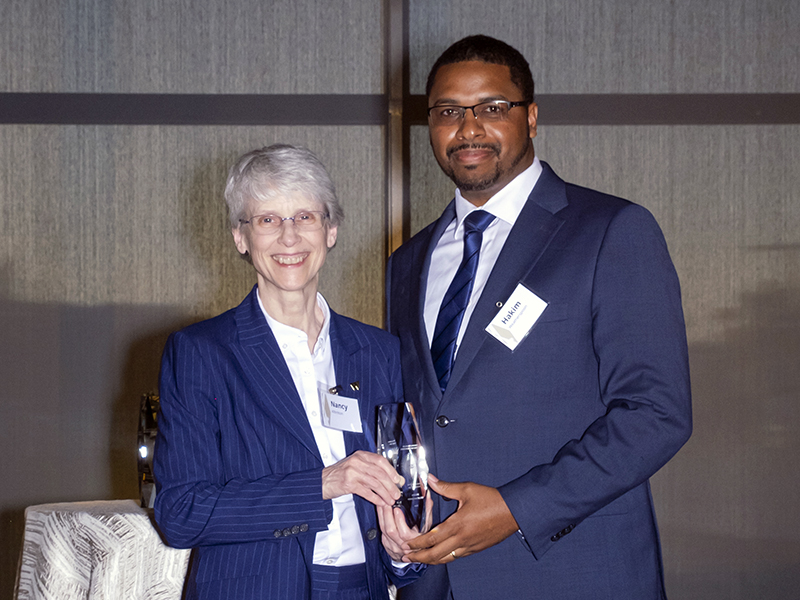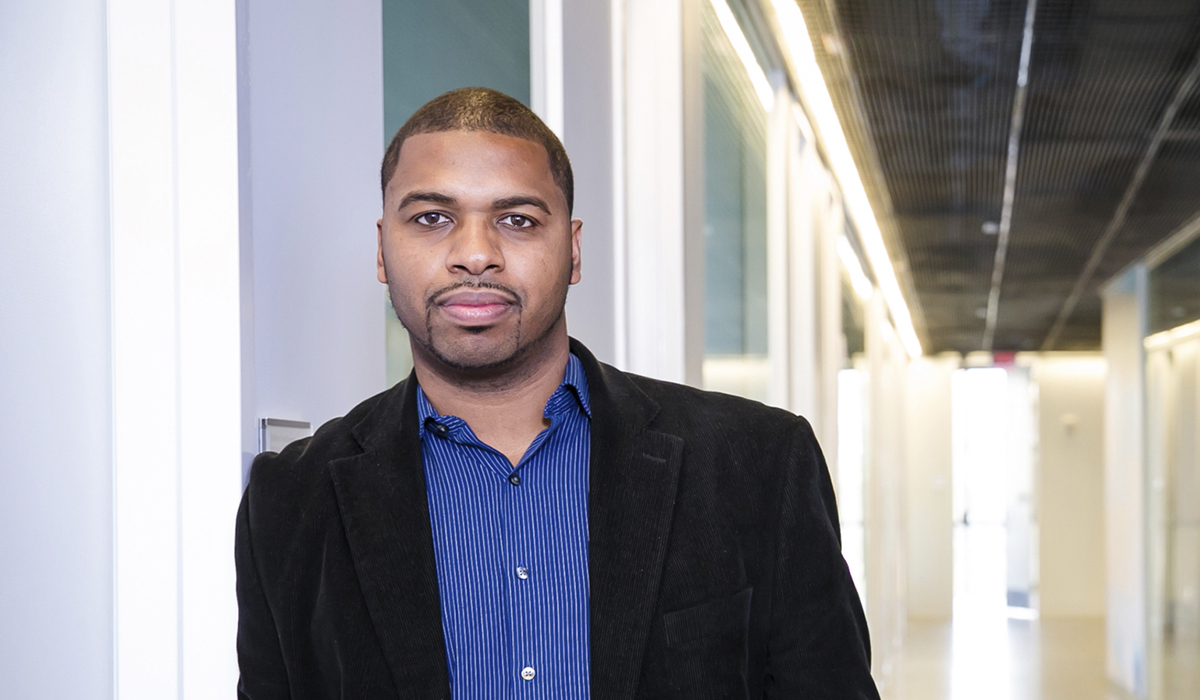Hakim Weatherspoon (B.S., ‘99) was a rare breed of computer engineering student. As a Husky football player — and one who was named to the Pac-10 All-Academic team, at that — Weatherspoon’s grit and determination on the gridiron was matched by his grit and determination in the classroom. A quarter century after he last took the field for the University of Washington, Weatherspoon scored a College of Engineering Diamond Award from his alma mater for “embracing the power of diversity, equity and inclusion” in his role as Associate Dean for Diversity, Equity and Inclusion in the Cornell Bowers College of Computing and Information Science.
Football and computing may appear to be an unlikely combination, but to Weatherspoon, his journey from student-athlete to computer science professor and college leader is proof that there is a place for everyone when it comes to the field that ultimately defined his career — even if it wasn’t the one he originally imagined for himself.
“Funny thing is, I actually wanted to be an electrical engineer, like my brother and uncle,” Weatherspoon said with a laugh.
As fate would have it, he had enrolled in the Allen School’s introductory programming course — his first exposure to programming — and was doing “pretty well,” he said. So well, in fact, that a counselor in the UW’s Minority Science & Engineering Program (MSEP), which served as a bridge program for aspiring engineering students from underrepresented groups, urged him to apply to computer engineering. At the time, Weatherspoon was skeptical, but he had not yet completed the prerequisites for electrical engineering when he was accepted into the Allen School.
He decided to run with it.
“It really clicked with me, and I enjoyed it a lot. And it made a lot of sense,” Weatherspoon recalled of his first foray into computing. “It was one of those things where you didn’t grow up with programming experience, but you had exposure in college and really liked it and excelled at it.”
His experience in the MSEP not only helped him find his way to computing, but it also helped shape his thinking about DEI as a faculty member.
“The bridge program really changed my life in a lot of ways,” Weatherspoon said. “The gap between high school and college is significant. The MSEP taught us how to behave — where to sit in class, how to actually study. It got you ahead in classes like calculus and chemistry by slowing things down and allowing you to see things for a second time.”
It also, crucially, created a sense of community.
“You have a marginalized or underrepresented population that can feel isolated. If you help offset that, they can do well,” Weatherspoon said.

Professor Ed Lazowska, the Bill & Melinda Gates Chair Emeritus in Computer Science & Engineering at the Allen School, noted that Weatherspoon’s record of leadership on DEI makes him an extraordinary role model — and his influence extends far beyond Cornell.
“Hakim is one-of-a-kind,” said Lazowska, who chaired what was then the Department of Computer Science & Engineering when Weatherspoon was a student. “A true student-athlete. A top-tier computer engineer on the faculty of one of the nation’s top programs. An entrepreneur. A proud Husky. And a person who has changed the landscape for traditionally marginalized individuals in the field through his leadership, mentorship and service — and through the example that he sets.”
Weatherspoon has set that example by developing a range of programs to support students at all stages of their academic journey — and offered a solid game plan for others to follow. After noticing how many students struggled in their second year, Weatherspoon co-founded an immersive summer program at Cornell, inspired by his experience in the MSEP, to prepare rising sophomores for upper-level computer science coursework. The program, known as CSMore, offers participants an opportunity to develop research skills and explore career pathways in academia and in industry. It also gives students an opportunity to build relationships with their professors as well as with each other. An extension program, CSMore Works, provides program alumni with even more opportunities to engage as a cohort with faculty, industry experts and other CSMore alumni.
“Sophomore-level courses at Cornell are really gateway courses — they are required to get into the major, and you have to get a certain GPA,” Weatherspoon explained. “I teach one of those courses and noticed that we were losing a lot of underrepresented minority students. My colleagues noticed the same, so we said, let’s do what we do for pre-freshmen, but as a bridge into sophomore year.”
For students who are interested in exploring research as a career, either in industry or academia, there’s the SoNIC program. This week-long summer research workshop is designed for students enrolled in an undergraduate or master’s degree program in science, technology, engineering or mathematics (STEM) in the United States and Puerto Rico. For those students who have already decided to jump into academic research, there’s Engage LEAP, which supports Cornell Ph.D. students’ academic, professional and personal growth through a variety of resources and activities, from dissertation workshops to networking opportunities. Weatherspoon is an advocate in the LEAP Alliance, which is a nationwide network of 30 Ph.D. programs — including the Allen School — working to diversify leadership in the professoriate.
According to Weatherspoon, the initiative has succeeded in changing the face of Cornell’s Ph.D. program. “We went from essentially zero to nearly 10% underrepresented minority students,” he said.
But Weatherspoon knows that diversifying leadership in the field requires reaching students before they even set foot on a college campus — perhaps even before they dare to dream of a career in computer science. Recognizing that such opportunities are not evenly distributed, particularly when it comes to low-resource communities, he co-organized Code Afrique with a mission “to give African students a window into the world of computer science and its vast potential for development in this era of technology.”
Code Afrique engages students from partner high schools in learning about the latest developments in computer science. The program includes interactive coding workshops culminating in a competitive hackathon along with mentorship sessions led by volunteers from Cornell, MIT, Google and more. Code Afrique has reached as many as 500 students in countries including Ghana, Eswatini and Nigeria. According to Weatherspoon, they’re not the only ones whose lives are changed by the experience.
“It has a deep impact on the volunteers,” he said. “The people who go there — the Cornell students who participate — are often not from those countries. So it affects their thinking and sometimes their career path, as well.”
Whether in a high school classroom half a world away or a college computer science lab close to home, Weatherspoon’s efforts to transform students’ lives — and the entire field of computing — continues to be an inspiration to those who know and work with him.
“He’s a very genuine person, and he cares deeply,” said Kavita Bala, Dean of the Cornell Bowers College of Computing and Information Science. ”He’s an optimist, and he brings this positive energy to effect change in a way that not everybody has.”
For students looking to follow in Weatherspoon’s footsteps in computer science, he’s clearly mastered the art of the assist.
“In a lot of places, he’s been the first,” said Ayanna Howard, Dean of Engineering at The Ohio State University and a frequent collaborator of Weatherpoon’s. “He ensures that he provides and builds up an environment where he is not the last.”
Read more about Weatherspoon’s achievements here and watch the Diamond Awards video tribute here.


